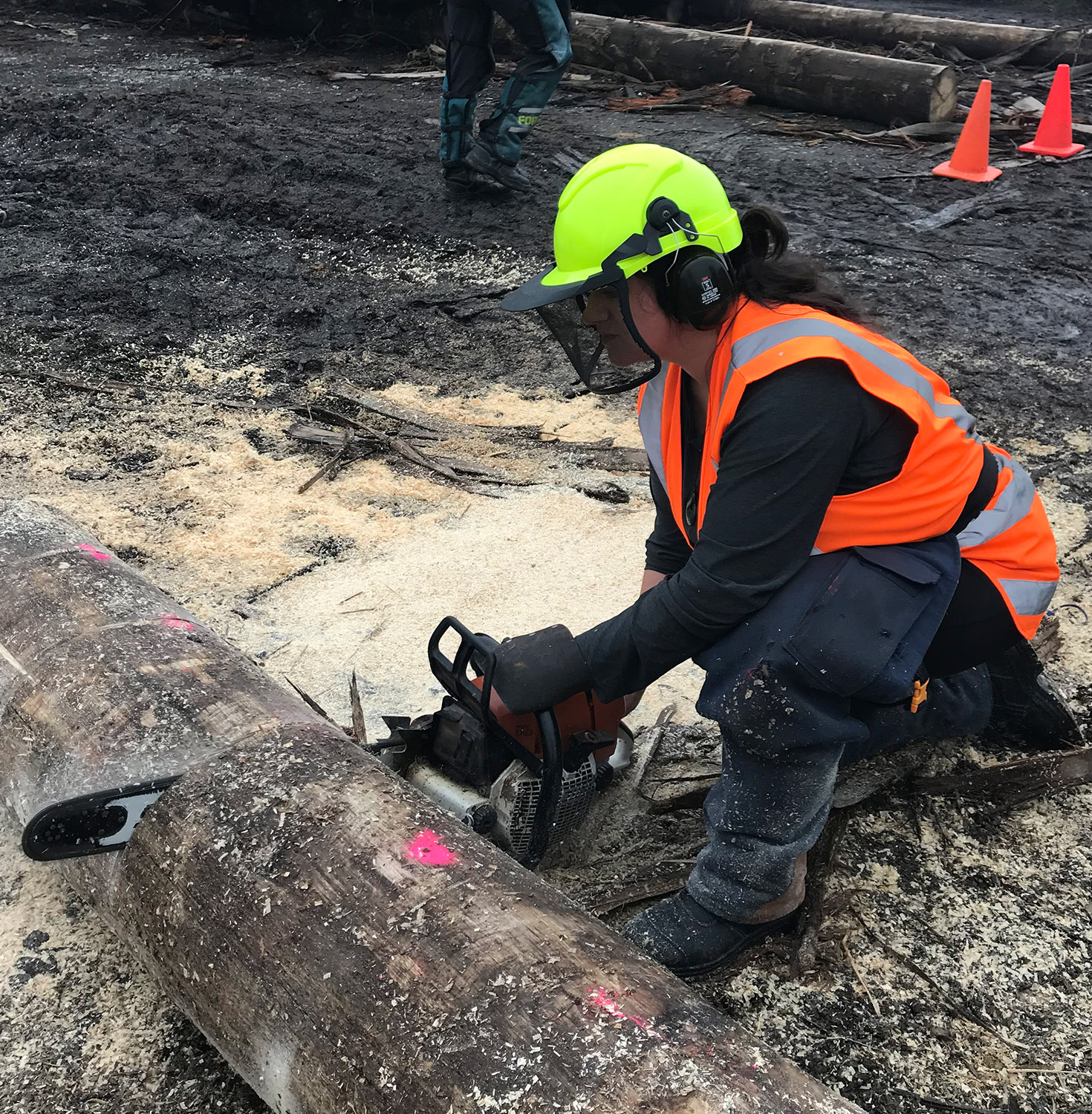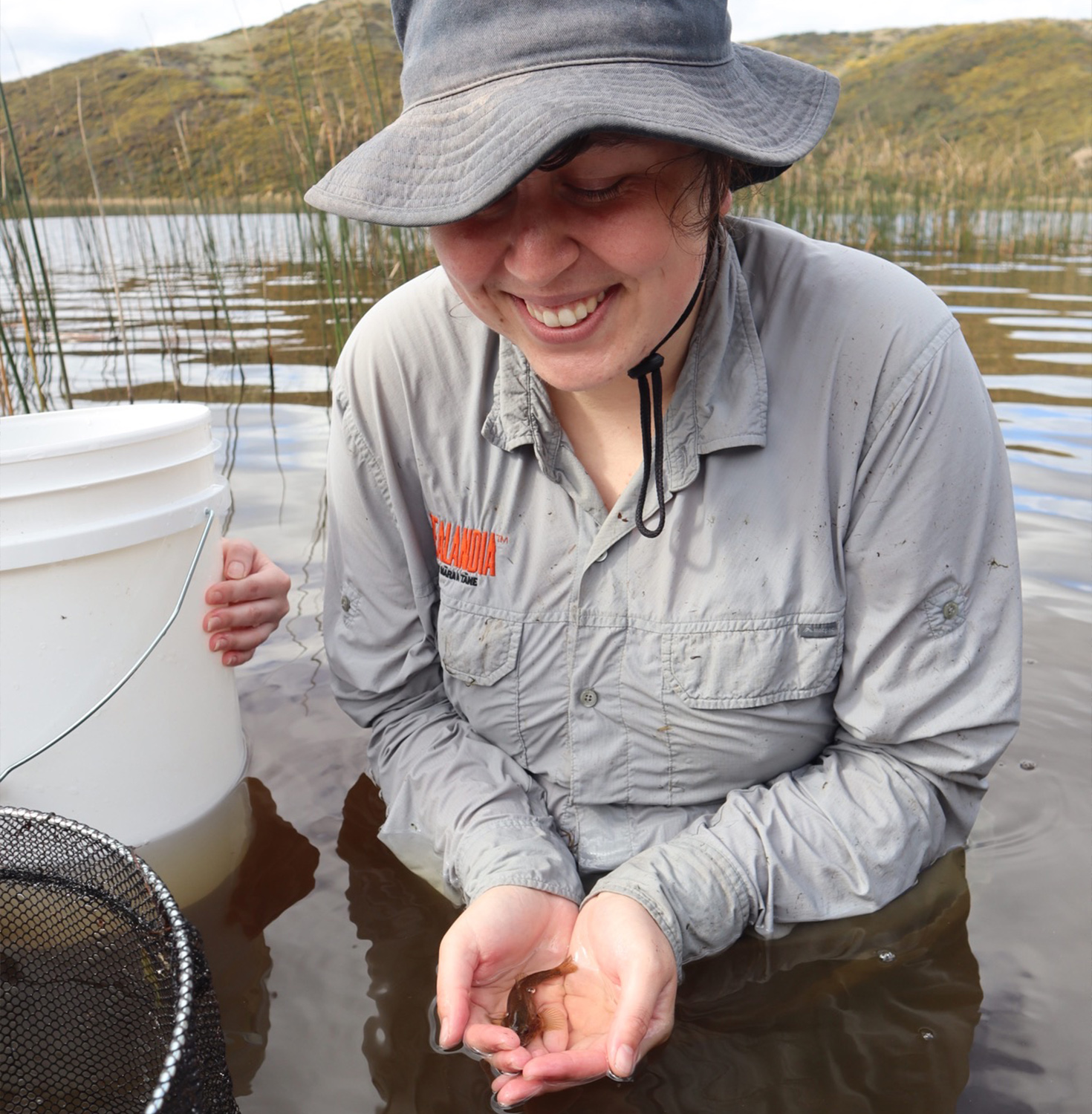Conservation training takes you places
A connection to the land
A love of the outdoors, connecting to the land and protecting our taiao (natural world) meant a desk-based job was never going to be the best fit for Evie Reay.
After school, she followed her love of skiing and became an instructor, working winters at Cardrona ski field in Otago and a season at Marmot Basin in Alberta, Canada. Then she spent almost three years working in animal control and parking in Wanaka, during which time she also began her journey in te Ao Māori.
Looking for a change of direction, in 2020, she was a successful applicant for the popular Kaitiaki Whenua Trainee Ranger(external link) programme at NMIT Te Pūkenga.

“There were lots of aspects of the programme that appealed to me—learning how to use a chainsaw, pest control, native planting and restoration projects,” she says.
"At times, it took me out of my comfort zone, but I loved the diverse range of things we did during the year."
Her six-week summer placement with the West Coast Regional Council involved working on the Mt Te Kinga predator-free project, where she was in a team placing trail cameras and a motor lure every 100 metres around the base of the mountain to monitor what pests were present. Then they analysed the footage and reported the findings.
Within a couple of weeks of finishing the trainee ranger programme in 2021, Evie had a new position as a Kaitiaki Whenua (Ranger) with Ngāti Koata Trust helping to restore iwi whenua.
“I was involved in native planting, wetland restoration, pest control and the continued restoration of Lake Moawhitu on Rangitoto ki te Tonga (D’Urville Island), as well as restoring the mauri of Maitahi awa (the Maitai river).”
Through her work with Ngāti Koata, Evie spent time with the hydrology team at Nelson City Council. When a role as a Water Quality Technician with the team came up, she was a successful applicant.
“My job involves testing water samples to check for contaminants or other problems,” she says. “I spend most of my time out in the field visiting various sites, gathering samples and recording data.”
“When I look at where I am working now and all the experiences I have had, much of it started with the core skills I learned on the NMIT Te Pūkenga kaitiaki whenua course.”
Take your passion for conservation into employment |
|---|
|
Diverse job opportunities are available across the motu for people who have shown a desire to learn about Aotearoa’s unique biodiversity and how we can best care for it. The Kaitiaki Whenua Trainee Ranger(external link) programme at NMIT Te Pūkenga builds skills so ākonga can build hiking tracks, implement animal and pest control, understand our New Zealand ecology, and how to use the latest conservation technology—all the skills you need to be employed as a ranger. |
Doing something different every day
Growing up in Westport set the scene for Tia Button, who has always been a fan of the outdoors.
After graduating from the kaitiaki whenua programme in 2020, Tia is grateful for the enthusiasm and support from her tutors that ensured her passion was nurtured, even throughout the lockdowns that forced ākonga (students) online.
“The programme was awesome for me as I was able to get a taste of a variety of things so I could figure out what I enjoyed and what I didn’t,” she says.

Tia applied for a job at Zealandia Te Māra a Tāne(external link) without ever setting foot in the sanctuary before. Even though there were over 100 applicants, she landed a job by being herself and playing to her strengths.
“I did my mihi at the interview, and I think that landed me the job,” she says. “I moved up a couple of days before I was due to start and found a flat. Thankfully, it all worked out.”
Every day is different in Zealandia, which Tia really enjoys.
“Today was a bit slow because I’ve been doing data entry, but last week we coordinated a ‘bait out’ operation across 225 hectares,” Tia says.
“There’s a lot of plant monitoring, work with manu (birds) during the breeding season and coordinating the bird feeding volunteers, and recently I was involved in a fish translocation project.”
Tia believes there are loads of opportunities for people looking for a career in conservation.
“You just need to be enthusiastic and willing to get involved,” she says.
“Working outdoors is incredibly good for my mental health. I am blessed to be able to see beautiful places and hang out with tuatara and manu in the ngahere.”
Conservation skills for everyone, nationwide |
|---|
|
NMIT also delivers a range of short courses(external link) that ākonga (students) can study independently to grow their individual skills, including predator trapping, plant identification, weed management and even how to use a chainsaw. Any of these courses are ideal for people working or volunteering in land-based conservation activities, with online and workshop study options at various regional locations throughout the year. |


